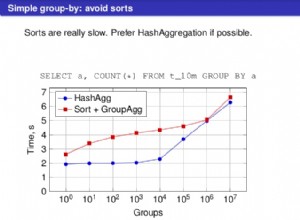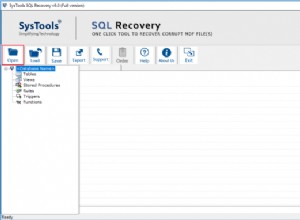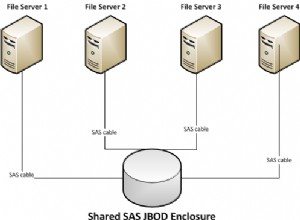Supponi di avere prodotti e categorie. Un cliente afferma che è necessario utilizzare altri processi aziendali per le categorie con valore di valutazione superiore a 50. Hai una solida esperienza e capisci che domani questo valore potrebbe essere diverso:127,37. Per evitare questa situazione, scrivi il codice nel modo seguente:
public class Category : HasIdBase<int>
{
public static readonly Expression<Func<Category, bool>> NiceRating = x => x.Rating > 50;
//...
}
var niceCategories = db.Query<Category>.Where(Category.NiceRating);
Sfortunatamente, questo non funzionerà se devi selezionare i prodotti dalle categorie corrispondenti. NiceRating ha il tipo Expression
Pertanto, dobbiamo convertire Expression
public class Product: HasIdBase<int>
{
public virtual Category Category { get; set; }
//...
}
var niceProductsCompilationError = db.Query<Product>.Where(Category.NiceRating); Fortunatamente, è abbastanza facile!
// In fact, we implement a composition of statements,
// which returns the statement matching the composition of target functions
public static Expression<Func<TIn, TOut>> Compose<TIn, TInOut, TOut>(
this Expression<Func<TIn, TInOut>> input,
Expression<Func<TInOut, TOut>> inOutOut)
{
// this is the X parameter => blah-blah. For a lambda, we need null
var param = Expression.Parameter(typeof(TIn), null);
// we get an object, to which this statement is applied
var invoke = Expression.Invoke(input, param);
// and execute “get an object and apply its statement”
var res = Expression.Invoke(inOutOut, invoke);
// return a lambda of the required type
return Expression.Lambda<Func<TIn, TOut>>(res, param);
}
// add an “advanced” variant of Where
public static IQueryable<T> Where<T, TParam>(this IQueryable<T> queryable,
Expression<Func<T, TParam>> prop, Expression<Func<TParam, bool>> where)
{
return queryable.Where(prop.Compose(where));
}
// check
[Fact]
public void AdvancedWhere_Works()
{
var product = new Product(new Category() {Rating = 700}, "Some Product", 100500);
var q = new[] {product}.AsQueryable();
var values = q.Where(x => x.Category, Category.NiceRating).ToArray();
Assert.Equal(700, values[0].Category.Rating);
}
Questa è l'implementazione della composizione della dichiarazione in LinqKit. Tuttavia, Entity Framework non funziona con InvokeExpression e genera NotSupportedException. Sai che LINQ ha degli svantaggi? Per aggirare questa restrizione, in LinqKit utilizziamo un metodo di estensione AsExpandable. Pete Montgomery ha descritto questo problema nel suo blog. La sua versione di Predicate Builder funziona sia per IEnumerable
Ecco il codice così com'è.
public static class PredicateBuilder
{
/// <summary>
/// Creates a predicate that evaluates to true.
/// </summary>
public static Expression<Func<T, bool>> True<T>() { return param => true; }
/// <summary>
/// Creates a predicate that evaluates to false.
/// </summary>
public static Expression<Func<T, bool>> False<T>() { return param => false; }
/// <summary>
/// Creates a predicate expression from the specified lambda expression.
/// </summary>
public static Expression<Func<T, bool>> Create<T>(Expression<Func<T, bool>> predicate) { return predicate; }
/// <summary>
/// Combines the first predicate with the second using the logical "and".
/// </summary>
public static Expression<Func<T, bool>> And<T>(this Expression<Func<T, bool>> first, Expression<Func<T, bool>> second)
{
return first.Compose(second, Expression.AndAlso);
}
/// <summary>
/// Combines the first predicate with the second using the logical "or".
/// </summary>
public static Expression<Func<T, bool>> Or<T>(this Expression<Func<T, bool>> first, Expression<Func<T, bool>> second)
{
return first.Compose(second, Expression.OrElse);
}
/// <summary>
/// Negates the predicate.
/// </summary>
public static Expression<Func<T, bool>> Not<T>(this Expression<Func<T, bool>> expression)
{
var negated = Expression.Not(expression.Body);
return Expression.Lambda<Func<T, bool>>(negated, expression.Parameters);
}
/// <summary>
/// Combines the first expression with the second using the specified merge function.
/// </summary>
static Expression<T> Compose<T>(this Expression<T> first, Expression<T> second, Func<Expression, Expression, Expression> merge)
{
// zip parameters (map from parameters of second to parameters of first)
var map = first.Parameters
.Select((f, i) => new { f, s = second.Parameters[i] })
.ToDictionary(p => p.s, p => p.f);
// replace parameters in the second lambda expression with the parameters in the first
var secondBody = ParameterRebinder.ReplaceParameters(map, second.Body);
// create a merged lambda expression with parameters from the first expression
return Expression.Lambda<T>(merge(first.Body, secondBody), first.Parameters);
}
class ParameterRebinder : ExpressionVisitor
{
readonly Dictionary<ParameterExpression, ParameterExpression> map;
ParameterRebinder(Dictionary<ParameterExpression, ParameterExpression> map)
{
this.map = map ?? new Dictionary<ParameterExpression, ParameterExpression>();
}
public static Expression ReplaceParameters(Dictionary<ParameterExpression, ParameterExpression> map, Expression exp)
{
return new ParameterRebinder(map).Visit(exp);
}
protected override Expression VisitParameter(ParameterExpression p)
{
ParameterExpression replacement;
if (map.TryGetValue(p, out replacement))
{
p = replacement;
}
return base.VisitParameter(p);
}
}
}




